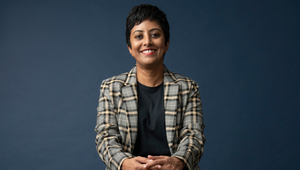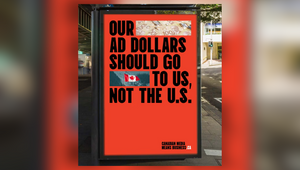
Film Craft Jury President Sick of “Gimmicks,” Wants “Real Work” at Cannes

When Egyptian film director and co-founder of Good People Films Ali Ali steps into the Palais as Film Craft jury president at this year’s Cannes Lions, he does so as the no-nonsense creative voice calling time on empty spectacle. “I’ve seen all the tricks – the gimmicks, the stunts, the ghost ads,” he says. “Now that I’m almost 50, that stuff makes me nauseous.”
The director behind the viral classic ‘Never Say No to Panda’ is determined to shift focus back to intentional, brand-building craft. “Every decision – visual, audio, editorial, casting – needs to feel considered. Not ornamental. Not auto-generated. But considered.”
Ali, the first Egyptian to helm a jury at Cannes, isn’t just judging ads – he’s searching for evolutionary leaps. This year, he will look at the work like a palaeontologist, constantly seeking a new kind of ad that nobody can put into a ‘type’.
From AI’s rise to the need for tighter storytelling – “a great ad should grab you fast, hold you briefly, and get the hell out” – Ali’s perspective is sharp, funny, and refreshingly frank.
As the MENA region gains global creative recognition, Ali’s appointment on this jury is a reminder that great graft is still about purpose. Here’s what he had to say about the fast-approaching festival next week.
LBB> Your appointment as the first Egyptian jury president at Cannes Lions is historic. How does this milestone resonate with you personally, and what does it signify for the MENA region's creative landscape?
Ali> It’s a huge honour. A definite hashtag goals moment for me. I had to read the email twice to make sure it wasn’t a prank. Film Craft has always been my personal favorite, and I cherish the awards I’ve won in this category.
Being named Film Craft jury president feels personal, but it also feels bigger than me. The fact that a director from Cairo, Egypt, is stepping into this role says something about where the MENA region is headed creatively. It shines a light on a part of the world that’s long been under-recognised, despite the incredible talent and work coming out of it. I hope this milestone opens more doors for voices from our region to be seen, heard, and taken seriously on a global stage.
LBB> The Film Craft category celebrates the artistry behind storytelling. In today’s digital-first world, how do you define ‘craft,’ and what elements truly elevate a piece of work from good to unforgettable?
Ali> Craft is constantly in flux, always evolving. What it meant in 2002, when I joined the industry, is different to what it means today, and wildly different to what it meant in the ‘50s – when art directors Helmut Krone and Bill Bernbach would stay up late at the typesetter, obsessing over leading and kerning for tomorrow’s Volkswagen print ad.
Since the ancient Egyptians, craft and tools have always gone hand in hand. And the tools we have readily available today – whether you’re an art director, a cinematographer, or a motion designer – are light years ahead. Craft has adapted to those tools. It reflects the moment we’re in.
And now, with the rise of AI, we’re entering another quantum leap. Like it or not, we’ll soon be talking about the craft of ‘prompting’, or so and so is a great ‘prompter’, the precision and brilliance of a well-written query. That idea makes me sad, to be honest. But it’s a reality we’ll have to confront sooner than we think.
What separates good work from great, regardless of the tools, is intention. Every decision – visual, audio, editorial, casting – needs to feel considered. Not ornamental. Not auto-generated. But considered. As a jury, we need to feel like a lot of thought and effort went into each piece. For labour is the throughline of great craft, no matter the decade. I always like to quote John F Kennedy on set: “We’re not doing it because it is easy, we’re doing it because it is hard.”
LBB> You’ve directed campaigns for major global brands while maintaining a distinct storytelling voice. How do you expect this balance between brand storytelling and craft – to show up in the work you'll be judging in the Film Craft category?
Ali> Having spent over a decade on the agency side, I’ve seen all the tricks – the gimmicks, the stunts, the one-off activations crafted purely for award shows. The ghost ads for CSRs, and the four-to-six-minute Save the Children film that was never commissioned. I’ve seen it all. And to be honest, now that I’m almost 50, that stuff makes me nauseous.
I’ll be looking out for real work. Real work for real clients/brands. Work that actually ran. Craft with a purpose. Casting that sells. Production design that builds brands. Craft put to good use, and not just cinematography for cinematography’s sake. I’ve always been averse to the saying ‘it’s shit, but it was really well shot’, ‘it sucks but the casting is great!’. To me, that’s like stopping to observe beautiful curtains on the Titanic!
Because let’s be clear: if you’re not interested in selling, then advertising might not be the right place for you. Go make art. Go make films. But in our world, creativity has to serve the brand. That doesn’t mean it has to be a hard sell. Look at what Kim Gehrig and AMV did for Libresse – it’s not transactional, but it’s absolutely brand-building. That’s the sweet spot. Great craft, in service of something real.
LBB> 'Never Say No to Panda' remains a cultural icon in advertising. As someone who has created viral and beautifully crafted work, how do you see the relationship between entertainment value and craft in this year’s entries?
Ali> Good craft has to entertain. I think the word ‘entertaining’ is wildly underrated in our industry – and in film in general, to be honest. I have a personal allergy to anything that doesn’t entertain me. I zone out. I fall asleep. I vanish.
The same goes for advertising: if it doesn’t grip you, what’s the point? A great ad should grab you fast, hold you briefly, and get the hell out. Make it short. Make it sharp. Make it unforgettable. ‘RIP Leon’ from Apple two years ago is a great example. I was on the Film jury that year, and I fought long and hard to make it a Grand Prix, knowing very well it would piss people off, but hoping (lowkey) that it would put an end to 14-minute and two-hour-long entries.
LBB> As jury president, what qualities are you looking for in the work?
Ali> One thing I’ll be asking the jury to consider – something I’ve become acutely aware of over the years of judging – is the idea of ‘this type of ad’. Not ‘this ad’, but this ‘type of ad’. You may not have seen this ad before, but how many times have you seen ‘this type of ad’? This formula. This template. This editing style to that music. The familiar genre we’ve all seen a hundred times before.
I want us to dig deeper. I’ve been reading a lot of Richard Dawkins lately, and I’ll encourage the jury to think like palaeontologists – are we looking at another example of a known species, or are we discovering something new? A fresh genus. A new evolutionary leap in the world of film craft. Juan Cabral’s ‘Gorilla’ for Cadbury was exactly that when it came out in 2007. No person on the globe had seen ‘this type of ad’ before.
Because, let’s be honest, most of the work we see fits neatly into existing templates. It’s the other 10% I’m excited to find. The wild, rare, unclassifiable entries. That’s the work I’m passionate about celebrating and, quite honestly, excited to watch.
LBB> For emerging directors aiming to make their mark, what advice would you offer about honing their craft and navigating the industry's challenges today?
Ali> Don’t do anything like that ‘type of ad’. Go do something entirely original. Even if it sucks. It’s ok to fail. Fail fast and move on. But don’t just copy the existing formulas.
It’s scary as hell – when you’re onto something truly original, everyone will be against you, clients will be very uncomfortable, but that is the road to greatness. And pretty please with sugar on top, make it under 60 seconds.















